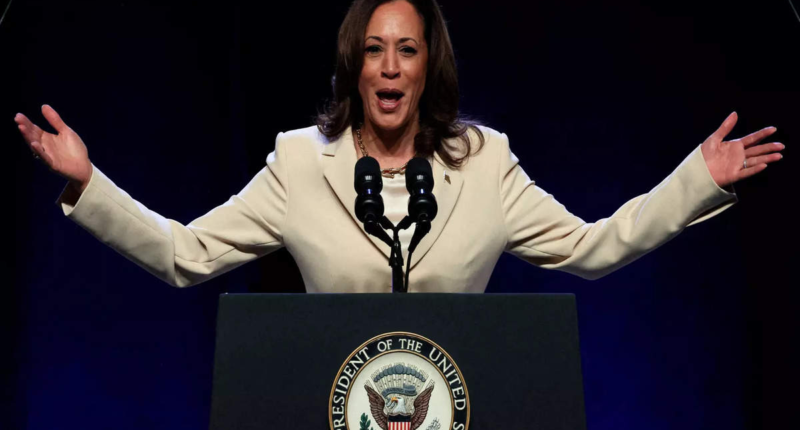The 2024 U.S. Presidential Election has concluded, and Kamala Harris’s campaign ultimately fell short in the race for the White House. As America reflects on this significant political event, analysts and voters alike are examining the reasons behind Harris’s loss. Here, we delve into the key factors that may have influenced the election outcome, as well as the implications for the future of U.S. politics.
Table of Contents
Kamala Harris’s 2024 Campaign: A Quick Overview
Kamala Harris ran a campaign centered on progressive policies and social reform. As the sitting Vice President under President Joe Biden, she highlighted her administration’s achievements while outlining plans for continued progress in healthcare, education, climate action, and social justice. Her campaign focused on building coalitions, expanding voter outreach, and addressing critical issues such as climate change and economic inequality.
Despite these efforts, several factors seem to have influenced voter sentiment, contributing to her loss in this historic election.
Key Factors That Contributed to Kamala Harris’s Loss
- Economic Concerns Amid Rising Inflation One of the primary concerns for American voters in 2024 was economic stability. Persistent inflation, rising living costs, and economic uncertainty affected many households. Although Harris’s campaign emphasized job growth and economic recovery, these promises may not have resonated with voters who prioritized immediate economic relief and lower costs.
- Voter Sentiment on National Security and Immigration National security and immigration were also focal points in the election. Harris’s stance on creating pathways for immigration reform and promoting inclusive policies was seen as progressive by supporters, but it faced opposition from those who preferred stricter border policies. This divide in public opinion may have contributed to the decline in support from more conservative-leaning demographics.
- Challenges in Reaching Swing Voters Harris’s campaign aimed to mobilize a broad base, yet attracting undecided swing voters proved challenging. While her progressive policies appealed to young and urban voters, some traditional swing voters may have leaned toward her opponent, favoring a different approach to economic and national security policies. Securing swing states has always been crucial, and a shift in their voting patterns had a considerable impact on the final outcome.
- Voter Turnout and Engagement Effective voter turnout is often the backbone of successful campaigns, but turnout among certain demographic groups seemed lower than anticipated for the Harris campaign. Mobilizing key groups like young voters and minority communities proved challenging amid concerns about campaign messaging and perceived disconnect with pressing issues.
- Media Coverage and Public Perception Media coverage plays a vital role in shaping public opinion during any election cycle. Harris’s campaign faced an uphill battle against media narratives that occasionally highlighted controversies or policy criticisms, potentially impacting her image among undecided voters. While her supporters backed her policies on progressive reform, the media’s mixed portrayal may have influenced the perceptions of undecided voters.
Implications of Harris’s Loss for the Future of American Politics

Kamala Harris’s loss in 2024 signifies potential shifts within the Democratic Party and broader American politics. Here are some of the anticipated impacts:
- Reevaluation of Democratic Strategy
Harris’s loss may lead the Democratic Party to reassess its strategies, messaging, and policy focus areas to better resonate with broader voting demographics. There could be an increased emphasis on moderating some policies to appeal to a wider base while retaining the progressive values that define much of the party. - Rise of New Leadership
The 2024 election outcome might open doors for emerging leaders within the Democratic Party. As voters look for fresh perspectives, figures who can effectively address economic stability and national security may rise to prominence, shaping the future direction of the party. - Focus on Economic Reforms and Middle-Class Stability
One of the clear messages from this election was voters’ prioritization of economic concerns. Future candidates may place a stronger emphasis on immediate economic relief, job creation, and reducing inflation to ensure financial stability for middle-class Americans.
The Lessons from Kamala Harris’s 2024 Election Loss

Kamala Harris’s 2024 campaign faced unique challenges as she navigated economic concerns, public perception, and complex policy debates. Her loss in this election offers valuable insights into voter priorities and the shifting dynamics within U.S. politics. As the Democratic Party reflects on these results, the outcome could pave the way for new approaches to political messaging, policy reform, and leadership.
Kamala Harris’s legacy remains impactful, and her commitment to public service continues to inspire. As America moves forward, the lessons from this election will likely influence future campaigns, shaping the landscape of American politics.
New Jersey Times Is Your Source: The Latest In Politics, Entertainment, Lifestyle, Breaking News, And Other News. Please Follow Us On Facebook, Instagram, And Twitter To Receive Instantaneous Updates. Also, Do Checkout Our Telegram Channel @Njtdotcom For Latest Updates.









